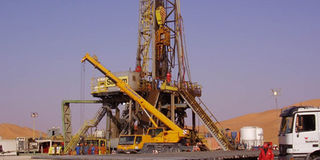Tullow hits yet another well of oil

Oil drilling in northern Kenya. The Exploration director at Tullow Oil Plc Angus McCoss says the success at the Ekales-1 is further evidence of the exceptional oil potential of our East African Rift Basin acreage. PHOTO/FILE.
What you need to know:
- This success at the Ekales-1 is further evidence of the exceptional oil potential of our East African Rift Basin acreage - McCoss.
- The announcement backs another the firm made in July, indicating Kenya’s oil meets the threshold for commercial exploitation.
- According to Tullow, the discovery shows that the product is occurring in reservoirs of between 60 and 100 metres, although further flow testing at the well which is planned in the future will confirm the actual amount of oil in the well.
Kenya’s hopes of producing oil were raised yesterday after British firm Tullow Oil Plc announced a fourth discovery at the Ekales-1 well in the northern part of the country.
In a statement Thursday, Tullow expressed confidence of further discoveries along the Rift Basin where Block 13T is located, further boosting the potential of Kenya to become an oil producer.
“This success at the Ekales-1 is further evidence of the exceptional oil potential of our East African Rift Basin acreage.
Having opened the first basin with the Ngamia-1 well last year, we are now increasing the pace of exploration in Kenya aiming for 12 wells over the next 12 months,” said Angus McCoss, Exploration director at Tullow Oil Plc.
The announcement backs another the firm made in July, indicating Kenya’s oil meets the threshold for commercial exploitation.
This signalled that the firm could start producing the oil once the necessary infrastructure is set up.
“The excellent results to date onshore Kenya are an important step towards understanding the overall basin potential and its commerciality,” the statement read.
Resources developed to date are of a scale that the partnership will initiate discussions with the government of Kenya and other relevant stakeholders to consider development options,” read part of the statement accompanying Tullow’s half year results.
Through the ministry of energy and petroleum, the government has however insisted that exploration companies drill a certain minimum number of wells, usually 40 in many industry practices, before the talk on production can begin.
Tullow is so far the only licensed exploration company that has made oil discoveries in Kenya.
It has drilled five exploration wells so far (Ngamia-1, Twiga South-1, Etuko-1, Ekales-1 and Paipai) out of which only Paipai has encountered light hydrocarbons indicating a possible presence of natural gas deposits while others have encountered oil deposits.
Should the discoveries lead Kenya to the oil production stage, the resource could provide a big relief to the country’s current account (measure between the value of imports and exports) as it lower the import bill which is currently inflated by the varying cost of petroleum products.
According to Tullow, the discovery shows that the product is occurring in reservoirs of between 60 and 100 metres, although further flow testing at the well which is planned in the future will confirm the actual amount of oil in the well.
In July, the company raised its oil resource estimate for Kenya by 20 per cent from 250 million barrels to the present estimate of 300 million barrels of oil, as a result of additional discovery at the Etuko- 1 well.





